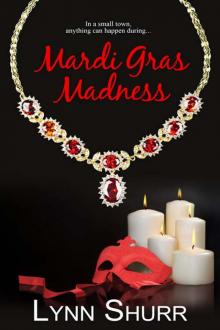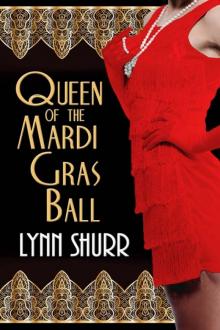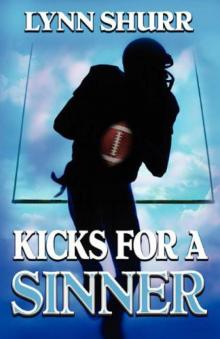- Home
- Lynn Shurr
Queen of the Mardi Gras Ball Page 14
Queen of the Mardi Gras Ball Read online
Page 14
“I wouldn’t dream of it. Say, is there a Sunday matinee at the theater here in town?”
“Naw, people are supposed to go to church on Sundays, and old Mr. Elmer who owns the place is a hard-shell Baptist. There’s a Charlie Chaplin flicker showing next Saturday,” Henri informed her hopefully.
“It’s a date, then. You, me, Tubbs and Boozoo. How about that?”
“Well, we’ll have to meet Tubbs and Boozoo at the Palace. Ma says they’re guttersnipes, but they’re lots more fun than the boys at St. Jeanne’s Parochial. Boo lives in that little white house behind his daddy’s gas station. I’ll ask Ethel’s Willie to get a message to Tubbs.” Henri thought for a minute. “We could take Willie with us, too, but he’d have to sit in the balcony.”
“I always thought sitting in the balcony might be fun.”
“Guess so, but only niggers are allowed up there, same as in church.”
“We don’t call them that, Henri. You should say colored or Negroes.”
“Yeah, that’s what Mama says, too.”
“Well, Willie is invited. My treat.”
****
Roz kept herself busy in acceptable ways leading up to her big date with four very young men on Saturday. She supposed Verna Harkrider would blow that up into an orgy involving three white men, a black, and the mad divorcée. Nothing Roz could do to stop the gossip other than to go about her business trying to adhere to Loretta’s wishes.
She took some of the generous allowance her father banked with Cousin André and attempted to do some Christmas shopping in the small stores that lined Main Street. At the only jewelry shop where watches were repaired and engraving done, Roz found a slim, silver ladies’ fountain pen among the heavy barreled masculine writing implements. She asked them to engrave it with Roxie’s name.
At the Chapelle Mercantile Emporium, she managed to buy a box of good writing paper that gathered dust among the school supplies. That would take care of Roxie whom Roz hoped would write when she got over being angry. She found a large sack of glass marbles there for Henri. He seemed to lose his on a regular basis to Tubbs and Boozoo who sometimes returned enough to Henri to allow the games to continue. Roz passed over a clasp knife the boy might have preferred, knowing his mother would object to any dangerous object.
La Petite Dress Shoppe, named for the size of the establishment and not for the large, sack-like dresses in last year’s styles that made up the merchandise, yielded nothing for her mother or Loretta. Still, she had the silk scarves bought in Paris and given to no one in the turmoil that followed her return to New Orleans. Mama could wear the red one with the oriental motif as a sash for her kimono when she went to her Mah-jongg club, and the dark blue with golden stripes scarf, once intended for her chilling motherin-law, would look lovely on Loretta.
Fortunately, the tobacco shop and newstand carried a good grade of Cubans for special customers, and Roz made a friend of the owner by purchasing two entire fragrant wooden boxes of the cigars, one for her papa and one for André. The array of cigarettes tempted her. She had days when she would have walked a mile for a Camel, but Loretta permitted no smoking in her home, and her husband took his cigars out on the porch or enjoyed them in his office at the bank. Just as well. Smoking might soothe her problems but wouldn’t solve them.
Catching Mrs. Elmo at the ticket window of Palace Theater, Roz bought a dozen moving-picture passes for Ben-Hur which the proprietors were showing again this year during the holidays. Evidently, no one in Chapelle ever tired of Ramon Novarro in the title role, Francis X. Bushman as the evil Messala, the thrilling chariot race, or the Christian message of the film. The passes would serve as small gifts for anyone she might have overlooked, and any leftover could be given to Henri and his friends.
On another fair day, Roz returned The Scarlet Letter to its place on the adult shelf at the library, still wondering how anyone could not suspect Arthur Dimmesdale right from the beginning. But then, men, apparently, could get away with anything until God caught up with them, an opinion she expressed to the library volunteer of the day. Miss Rena gave her a warm smile and nodded a head covered with short, frizzy salt-and-pepper hair. “That’s the Lord’s truth,” she agreed and encouraged the visitor to take out two books, The Sun Also Rises as well as The Great Gatsby.
The following day, Roz stopped by the only beauty salon in town and entered cautiously. All gossip stopped at the shampoo bowls and barber chairs as Roz asked for an appointment. Miss Irma, the proprietor of Irma’s Kuts and Kurls who had two girls performing their tasks under her, figured she could work Roz in if all she wanted was to have her roots retouched. It was. After looking at some of Irma’s frizzy handiwork, Roz made an instant decision to let her hair grow out into softer, looser waves.
Roz flipped through old copies of Good Housekeeping while she waited. Conversation resumed—women complaining about husbands and children, exchanging recipes, talking about their Christmas preparations, women with normal lives getting away from it all for an hour or two. No one spoke to her or to the redhead occupying the third chair.
Roz reached the bottom of the stack of magazines where an old copy of the Daily Mirror tabloid yellowed, still flashing its lurid headlines about the Hall-Mills murder case in which a wife arranged for the killing of her unfaithful husband and his paramour. Feeling queasy with the thought that she might have ended up as fodder for the press if the St. Rochelles had less influence, Roz wanted to get up and go silently back out into the drizzle that had begun to fall. She imagined the headline, “Queen of the Mardi Gras Ball Shoots Husband.”
As Roz stood, Miss Irma, sensing the loss of a client, whipped the drape from the neck of a customer, declared the fat, graying woman, gorgeous, absolutely gorgeous, and hustled her out of the chair. “Miz Boylan, you’re next.”
Irma did her best, talking about the weather and asking where Roz came from as if she really didn’t know. As the hairdresser waited for the timer to ding, she confided to Roz that the woman who had gotten the henna rinse and gone on her way after giving a big tip was one of Wally Broussard’s girls. When Roz looked blank, Irma leaned closer and said, “You know, a lady of the evening from out at the Barn.”
Overhearing, the young woman in the next chair who was having her black hair shingled and her brows waxed to a thin dark line, remarked, “I don’t know why you accept their business, Irma. Some of us would rather not mingle with Chapelle’s soiled doves, you know.”
“Well, Miz DeVille, I guess they got to get their hair done like anyone else. Wasn’t that one the Elmo’s youngest girl who got herself in trouble but never had the baby? You’re about the same age, aren’t you?”
“Yes, we knew each other slightly. She used to sell tickets at the theater. Her name was Marian then, but she goes by Eloise now, so as not to shame her family any further. They won’t have anything to do with her. If I keep running into trash here,” Mrs. Deville declared, “I might have to take my custom to Lafayette.” She looked pointedly at Roz.
The narrow-hipped young matron, showing a belly with the gentle curve of the mid-point of pregnancy, rose from her chair as the assistant named Nancy fussed over her, brushing off her client’s shoulder to remove snips of hair. The woman fished in her alligator handbag for a quarter and handed it to Nan along with the fee for the cut. She fluttered her fingers to the other ladies in the shop, making the diamonds of her wedding and engagement rings flash under the lights, and walked out beneath the awning where her driver and a large black auto waited by the curb.
“Last year’s Mardi Gras queen, can’t y’all just tell,” Nancy commented. “She’ll never have to work for a living since she snagged Mayor DeVille’s oldest boy right out of college this past spring. Eloise gave Betsy a whole dollar.”
When Roz left the shop, she carefully tipped fifty cents.
****
Saturday came at last as eagerly anticipated by Roz as by the boys. Henri ran ahead when he spied Boozoo and Tubbs waiting under the red an
d green marquee of the Palace, its rows and rows of light bulbs shining through the gray of the day. Ethel’s Willie, immaculately dressed in a clean white shirt and brown knickers that were probably Henri’s outgrown clothes, trailed behind.
She saw Henri tip his big, floppy cap over his eyes in imitation of his friends as if he were trying to make up for the fact that his mother had forced him to wear an argyle sweater vest over his shirt to keep off the damp. Roz doubted Henri even owned denim overalls like his friends wore over their cotton shirts.
Catching up with the group, she was about to purchase the twenty-five cent tickets when the boys protested. They wanted to sit in the pit right up close to the screen, so instead, Roz doled out fifty cents for all of them. Inside, she purchased each boy a popcorn, a soda pop, and some licorice whips, and sent Willie off to the balcony with an order to meet them again in the lobby after the film.
The inside of the theater hardly lived up to its name. The walls were green with a red border and a sagging, moth-eaten velvet curtain covered the screen. Despite the cleanliness of the aisles, a faint odor of mildew rose from the upholstered seats. Under the shadow of the balcony, a few young couples necked, not heeding the admonitions of the nuns at Ste. Jeanne’s that if the upper deck collapsed they would die in a state of sin.
Henri and his gang led Roz to the second row in the very front of the theater, the first row filled already with squirming boys. Before long, Mrs. Elmo positioned herself at the upright piano, stretched her fingers, and launched into a short recital to quiet the customers. Slowly the curtain opened, and the newsreel began to run. The young boys hooted at pictures of Mrs. Calvin Coolidge and her son in a sissy suit decorating Christmas trees in the Blue Room of the White House. Mrs. Elmo, who played appropriately festive holiday songs, removed her fingers from the keys, spun on her stool and told them all to hush or the usher would eject them from the theater, no refunds given.
After the shorts, Charlie Chaplin at last made his appearance, twirling his cane and doing his funny walk as he endured mishap after mishap. Mrs. Elmo punctuated every pratfall by pounding on the keyboard, then resumed a merry tune as the Little Tramp went on his way to the next disaster. Although Roz had seen the film before at the magnificent Loew’s State Theater in the city, she laughed along with the boys. One never got tired of Chaplin.
The lights came up, the smoochers in the back rows unclenched, and Roz followed the boys into the lobby. Beyond its glass doors, the sky had clouded over again. As they walked back toward Thibodeaux’s Canal Station, Boozoo wet the end of a licorice whip, smeared black under his nose and did a creditable imitation of the Chaplin walk, twirling an imaginary umbrella they soon wished was real. He and Tubbs peeled off at the gas station and ran for the cover of the Thibodeaux house. Roz, Henri, and Willie bolted for home but arrived soaked to the skin and laughing.
Loretta was not so amused. She hurried Henri upstairs to soak in a tub of hot water while she brought him dry clothes. Roz, glad she had worn the cloth coat with the wide lapels instead of the fur and a hat that shed some of the rain, stripped out of her wet garments and wrapped up in a housecoat and slippers. She made her way to the kitchen for a cup of the scalding coffee always on the stove and heard Willie regaling his grandmother with his adventure.
“Charlie, he threw down a banana peel and dat cop went bottoms up, he sho’ did.”
Willie’s shoes were already stuffed with newspaper and drying in the oven. His shirt hung over a chair back near the stove while the boy himself, wrapped in a quilt, drank coffee milk from a tin cup.
“What you say to Miss Roz for takin’ you?” Ethel prompted.
“I ’preciate it, Miss Roz. Thank you kindly.”
The cook gave the boy a stage plank ginger cookie frosted in pink. “You want I should bring coffee to your room, Miz Roz?”
“No, no, I think I’d like to sit here near the stove and listen to Willie talk about the movie. It was the nicest time I’ve had since I came to Chapelle.”
After a while, Ethel’s husband arrived to collect the boy. The cook looked on both of them fondly as they left. “Dat’s my man, Andy. He do yards ’round town. Met him at the AME. Helped me raise my boys and now Willie, too, since his ma run off. I done told Jackson, my oldest, she was no good, but men, dey doan listen.”
Roz nodded her agreement. “Say, Ethel, do you know anyone who could dye a dress for me?”
“Sho’. De laundry woman come on Monday. She do it fo’ you.”
“Great. Let me run upstairs and get it. I want it dyed red, bright red.”
Roz went to her room and rummaged through her trunk filled with the white, virginal clothing she’d worn all year. At the bottom lay her wedding gown wrapped in tissue and probably placed there by her mother as a reminder of the sanctity of marriage. If Emmaline expected her to burst into tears over it, she had another thing coming. The white plume she’d worn New Year’s Eve at the Yacht Club lay nearby. Roz seized that, too.
Roz returned to the kitchen with the dress draped over her arm. “Do you have a sewing shears handy, Ethel?”
Ethel found a pair in a drawer and watched wide-eyed as Roz snipped the bottom band of lace from the dress. She held it up against herself. The gown now hung satisfyingly above the knee.
“Oh, Miz Roz, dat’s a weddin’ dress. You shouldn’t be messin’ wit’ it.”
“Do you think the feather would take the dye, too? I can use the extra lace for a brow band. I am so sick to death of white. I want a red dress, a red dress for this New Year’s Eve.”
“I give it to Florence on Monday if you wants, but Miss Roz, you crazy to ruin a nice dress like dis, jus’ crazy.”
Chapter Twenty-Two
By Sunday night, Henri complained of a sore throat, and by Monday morning, he had a rising fever. Over a bowl of cool water, Loretta wrung out a rag and placed it on the boy’s forehead. She pulled his bed covers up to his chin.
“He caught pneumonia from being out in that rain, I just know it. Or it could be scarlet fever. I heard that was going around. Should I call the nuns at Mt. Carmel and tell them to keep the girls there for the holidays in case we get quarantined?” she asked Roz.
“I think you should call the doctor and see what he says before you cancel any visits.”
Loretta looked across the bed at her guest. “You’d like that, wouldn’t you? Your mama told me—”
“I’d like Henri to get well. I’ll stay in my room during his visit if you want.”
“That’s not necessary. I’m simply overwrought. Let me see if Dr. Landry will put us on his list of house calls for this afternoon. Please stay with Henri and keep the cool rags on his forehead.” Loretta rushed from the room.
“How are you feeling, kiddo?”
“Sore throat,” Henri croaked. “Think I can have some ice cream?” He pushed down his covers.
“I’ll go get it for you if your mama will allow it. What flavor do you want?”
“Chocolate—with sprinkles.”
“That may be pushing your luck, but I’ll see about it.”
Loretta returned and took over soothing her boy’s fevered brow. “Dr. Landry will be here shortly as soon as he finishes office hours. All his other calls are farther out in the country, so we are first on his list.”
“Henri would like some ice cream. I’ll go get it for him if you think it will be all right.”
“Well, he isn’t throwing up, so I suppose it would be okay. Just plain vanilla though.”
“Aw, Ma!” Henri motioned to Roz to come close. “Sprinkles,” he whispered in her ear.
“I’ll do my best to please.”
Roz ran her errand of mercy and returned to the house bearing a hand-packed pint of vanilla ice cream in a paper carton and a packet of chocolate sprinkles. For once, she was grateful for the cool weather. The ice cream hadn’t started to ooze from the seams of its container yet.
In the kitchen where Ethel stewed up a hen to make soup, Roz put two scoo
ps into a glass dish, added a pinch of sprinkles and a spoon, and stashed the rest of the treat in the coldest compartment of the icebox. She was starting up the stairs when a solid knock sounded on the front door.
“I’ll get it, Ethel,” she called and opened the door.
There he was, Dr. Pierre Boniface Landry, looking very professional with his black hat, tie, topcoat and medical bag. Despite this, she wanted to brush away the tired lines from around his dark, luminous eyes and run her finger down the silky slope of his mustache.
“Pierre, it’s good to see you again.”
“Roz, you’ve been well?” He looked at her hands, her ringless white hands holding a green glass bowl of vanilla ice cream.
“I’m getting better. And how are you?”
“Busy, very busy.”
“Yes, my uncle said you’d been called home to replace a doctor who had a heart attack.”
“You didn’t get my note?”
“No note, no calls, no letters.” She refused to take her eyes off his. She would not glance down even though her cheeks burned.
“I called. I sent a telegram, but your mother informed me that you and Buster had reconciled.”
“No reconciliation.”
Pierre looked at her hands again. “Your ice cream is melting.”
If her hands were as hot as her face, she supposed it was. Loretta called from the top of the stairs, “Ethel, is that the doctor?”
The worried mother moved down a few steps. “Roz, don’t keep Dr. Landry waiting on the porch.”
Roz stood aside and let the doctor pass. She followed him up the stairs and waited just inside Henri’s bedroom.
“What seems to be the trouble, young man?” he asked in a manner adopted from old Doc Spivey.
“Sore throat,” Henri said hoarsely.
“Any nausea or vomiting?”
“Naw, no upchuck. Can I have my ice cream now?” Henri’s eyes swerved to the dish in Roz’s hands.
“In a few minutes. We have to check some things first. It won’t hurt.” Pierre opened his black bag, took out his stethoscope and listened to Henri’s heart and lungs. He asked the usual, “Say Ahhh,” as he checked the boy’s throat, then his ears. Shaking down a mercury thermometer, the doctor attempted to insert it in Henri’s mouth. The boy’s hand came up.

 Sinners Football 02- Wish for a Sinner
Sinners Football 02- Wish for a Sinner Sister of a Sinner
Sister of a Sinner Courir De Mardi Gras
Courir De Mardi Gras Mardi Gras Madness
Mardi Gras Madness Paradise for a Sinner
Paradise for a Sinner Putty in Her Hands
Putty in Her Hands Son of a Sinner
Son of a Sinner Queen of the Mardi Gras Ball
Queen of the Mardi Gras Ball Love Letter for a Sinner (The Sinners sports romances)
Love Letter for a Sinner (The Sinners sports romances) A Wild Red Rose
A Wild Red Rose Sinners Football 01- Goals for a Sinner
Sinners Football 01- Goals for a Sinner The Convent Rose (The Roses)
The Convent Rose (The Roses) Kicks for a Sinner S3
Kicks for a Sinner S3 She's a Sinner
She's a Sinner